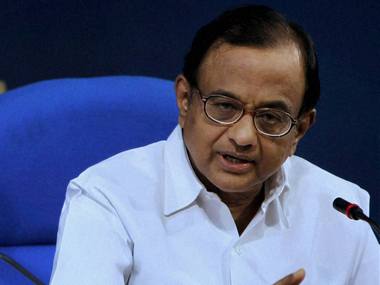The Indian markets are expecting Finance Minister P Chidambaram to deliver market-friendly policies to improve stock sentiments. Market-friendly policies include encouraging portfolio flows from abroad, investor-friendly tax laws, arm twisting the Reserve Bank of India (RBI) to reduce rates and providing a fillip to the domestic mutual fund industry.
The markets thrive on liquidity and the easier the access to liquidity, the better it is for markets in the short term. Markets and market participants have a short-term outlook and profits today matter more than potential losses tomorrow.
[caption id=“attachment_408346” align=“alignleft” width=“380”]  The FM should not give in to the demands of the market. PTI[/caption]
Indian equities are in a four-year bear market while the rupee is at close to record lows against the USD. Mutual fund assets are down over the last four years. It is no wonder that markets are looking at a “market-friendly” FM for respite.
Market-friendly policies are not necessarily economy-friendly policies. Infusing liquidity into markets creates bubbles, which when it bursts causes long term pain. The liquidity bubble burst in 2008, when the mortgage crisis emanating from the US took down markets and economies across the globe, fuelling the pain the markets are going through right now.
The FM should not give in to the demands of the market. Instead, the FM should focus on strengthening the economy for the long term and that, by itself, is going to take up most of his time.
He has to buy consensus on tough policy reforms, including reducing fuel subsidies. He has to make power producers and distributors, including State Electricity Boards, profitable and he has to introduce the GST (Goods and Services Tax) as quickly as possible.
The FM also has the tough task of handling an economy where growth is coming off and inflation is rising. The RBI has revised the GDP growth forecasts for 2012-13 to 6.5 percent from 7.3 percent levels and has raised inflation estimates from 6.5 percent to 7 percent levels.
The government’s fiscal deficit, projected at 5.1 percent of GDP for 2012-13, is expected to go up to over 5.5 percent of GDP levels on the back of slowing GDP growth and weakening government finances.
Market-friendly policies are politically acceptable while economy-friendly policies are politically difficult to digest. The question is does the FM have the political backing to take economy-friendly policies? A diesel price hike will not only help bring down the fiscal deficit but will also give the RBI headroom to use monetary policy to ease falling growth pressures. However, given the rising inflation expectations due to weak monsoons, there will be a huge political hue and cry over diesel price hikes.
The failure of power grids in the North of India in end-July 2012 brings to focus the poor financial condition of SEBs and distribution companies. SEB’s are running into deep losses, estimated at over Rs 2,00,000 crores and banks are unwilling to fund them, given the provisions they are making on SEB loans.
Lack of bank funding to SEBs is forcing power producers to refrain from selling power to them. A gridlock is created where power producers with power to sell cannot sell, leading to shortage of power.
The FM has to free power prices in order for SEBs to at least break even on power sales.
The introduction of GST is pending for almost two years now. It is required to be introduced on an urgent basis as the government is facing the prospect of a rising fiscal deficit. The FM has to focus his attention on GST introduction.
Over and above all this, the FM has to handle pressure emanating from global economies, including the sovereign debt crisis in the eurozone, weak China growth, and record high food prices in the US due to drought, etc.
The FM has his work cut out and if he does succeed in strengthening the economy, the market will automatically pay him back for his efforts. On the other hand, if market expectations get too high and the economy does not deliver, the fall will be even more severe.
Arjun Parthasarathy is the Editor of www.investorsareidiots.com, a web site for investors.


)
)
)
)
)
)
)
)
)



